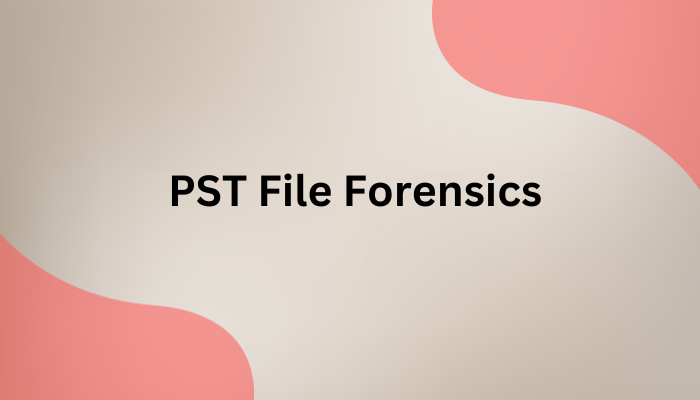Uncategorized | 4 Minutes Reading
PST File Forensics Investigation to Examine Outlook Data File

Forensics professionals handle different file types such as OST, PST, EML, MBOX, MSG, etc to investigate a case. Particularly when it comes to PST file forensics, the focus is on investigating all the data including emails, contacts, calendar items, and other mailbox data. Let’s understand more about the PST file and its core investigation aspects.
What Information do PST Files Contain?
PST is one of the default file formats of Microsoft Outlook. It is used for business-level communication information related to calendar events, contacts, tasks, journals, notes, etc. Analyzing these files accurately requires a special set of skills and tools.
Before analyzing, you need to first understand the PST file structure which consists of folders, sub-folders, and other items.
Anyway, when you want to perform PST file forensics without Outlook, the best option would be to opt for professional forensics software. The link to the forensics tool is given below.
Now, let’s move forward and see what data in the PST file you can analyze with the help of the tool.
PST File Forensics – Decode the Layers of Data within PST
The proficient investigation tool can help search for relevant information from the PST file that is linked to the case. Here are some of the core information that you’ll get to examine.
1. Internal Information
Every piece of information counts when doing PST file forensics. As an investigator, you can analyze; email data which includes sender & recipient, subject, Date and time, and Message body. You can also analyze contact names, email addresses, phone numbers, and organizational information. It doesn’t stop here. While investigating PST files, you can find event details such as event time, location of the event, who the attendees were, etc.
2. Metadata
With the PST file forensics tool, you can examine the data associated with each item creation and modification of timestamps, etc. This can ultimately help reconstruct the timeline of events.
3. Header Information
While investigating the header of the PST file using the tool, you can find the information about format version, encryption status, and other attributes.
4. Deleted Items
Sometimes deleted items contain more valuable information that could benefit the whole case. With the help of this tool, you’ll be able to recover the deleted items and analyze them.
5. Attachments
You may encounter emails with attachments while performing PST file forensics. These attachments could be the source of valuable information that could help you trace the footprints.
6. Search & Filtering
In case the investigation demands a search of keywords, timestamps, and results of search queries, then you can rely on the tool. It will provide you the option to customize the search and filter according to your needs.
7. Link Analysis
This plays a crucial role in PST file forensics. It helps investigators find out the relationships, connections, and patterns between various elements within the mailbox data. Evidently, the tool has the exact features that could match your expectations.
Here’s the screenshot of the tool in case you wondering what’s the tool looks like.

Conclusion
PST file forensics is a detailed process that requires attention to detail from start to end. Some suggest using PST viewer for analyzing the data inside it. Though it will help you view the content in the PST file, you’ll need a tool (like the above-mentioned one) that’s specially engineered for forensics purposes for doing in-depth analysis.
FAQs
Q- Why is PST file forensics important?
It is important because it allows experts to examine email communication, rebuild timelines, recover deleted items, and extract valuable evidence that can contribute to the overall understanding of a case.
Q- What challenges do forensics analysts face while investigating PST files?
Some of the challenges of PST file forensics include forensics examiners receiving encrypted PST files. Or, in some cases, they are assigned corrupt PST files for doing the analysis.
Q- What kind of information can be found in a PST file during the investigation?
A PST file for the investigation may contain emails, contacts, calendar events, attachments, links, or other digital activities.
Q- Can forensics analysis of PST files help in tracing email sources?
Yes, particularly the forensics of email header helps in tracing the source of the email. With the help of an IP address experts can track the geographical location.


